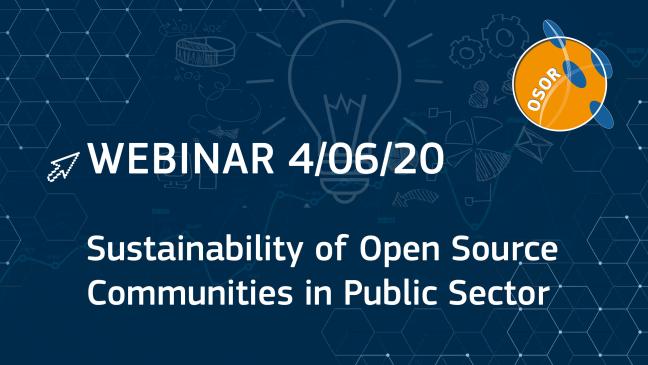The key purpose of the webinar was to present and receive feedback on OSOR’s draft Guidelines for Sustainable Open Source Software Communities in the Public Sector. Additionally, participants had the chance to hear from Nephtis Brandsma, product owner at Groningen municipality, and Fritjof Knier, CFO of Integreat, about their journeys toward being part of sustainable public sector open source software communities.

At the bottom of this page, you can find links to all the webinar presentations and a Webinar Background Document that presents an outline of OSOR’s Sustainability Guidelines. If you were unable to attend the webinar but are curious to learn more about the Guidelines, please go through the materials and send your feedback to our functional mailbox.
Below is the summary of the key discussions and ideas exchanged.
Webinar speakers’ presentations
Fritjof Knier and Nephtis Brandsma shared their experience in building sustainable public sector OSS communities.

Integreat, an application for facilitating newcomers’ integration into German municipalities, was launched as a student-led initiative in the city of Augsburg. Today, the application is used across 60 municipalities in Germany, and plans are underway to expand internationally. Fritjof pointed out that the ease of using and adapting the platform to one’s needs and the strong support that comes from the Integreat community helps make the application attractive to German municipalities. For example, Integreat regularly organises community events where participants can share lessons learnt and new ideas for the platform.

Nephtis Brandsma’s presentation focused on the use of the CONSUL platform for online participatory democracy in the framework of Groningen’s Stem van Groningen project. She stressed that one of the key reasons CONSUL was chosen is because of its active user base, the advanced functionalities of the platform, and the possibility to receive technical support whenever needed. Furthermore, what made the adoption of CONSUL sustainable within Groningen itself was the initial funding received from the Dutch Ministry of the Interior, the collaboration with other similar municipalities, and the project team’s willingness to invest resources in learning about open source software and in collaborating with the community.
Webinar discussion on the Guidelines for Sustainable Open Source Software Communities in the public sector
Our presentation of the draft Guidelines for Sustainable Open Source Software Communities in the Public Sector sparked some broader conversations about the relationship between public administrations and open source software communities.
We discussed the importance of finding a sustainable way for public administrations reusing open source software to give back to the software community behind it. We touched on the topics of permissive public procurement processes and the importance of funding. Participants also highlighted that public administrations should ensure that they have the capacity to become members of communities and to give back responsibly, for example, with dedicated resources for general maintenance of the software.
Another theme that emerged is the organisation and structure of public sector open source communities. Whilst every community is structured differently, there was a general agreement on the importance of having a dedicated community manager and on setting up a transparent governance model.
We also explored how public administrations using open source software should approach private sector contributions. It was suggested that public administrations developing their own open source software should play a more leading role in deciding on the direction of the project, with private sector contributions providing support and assistance. It was also highlighted that it is important for a public administration to not become dependent on any single supplier.
Finally, when it came to the guidelines themselves, some interest was expressed in further exploring the longevity of public sector open source software projects, particularly how to ensure political commitment to such projects in the long run.
If you have any additional thoughts to share on OSOR’s Sustainability Guidelines, feel free to get in touch.

